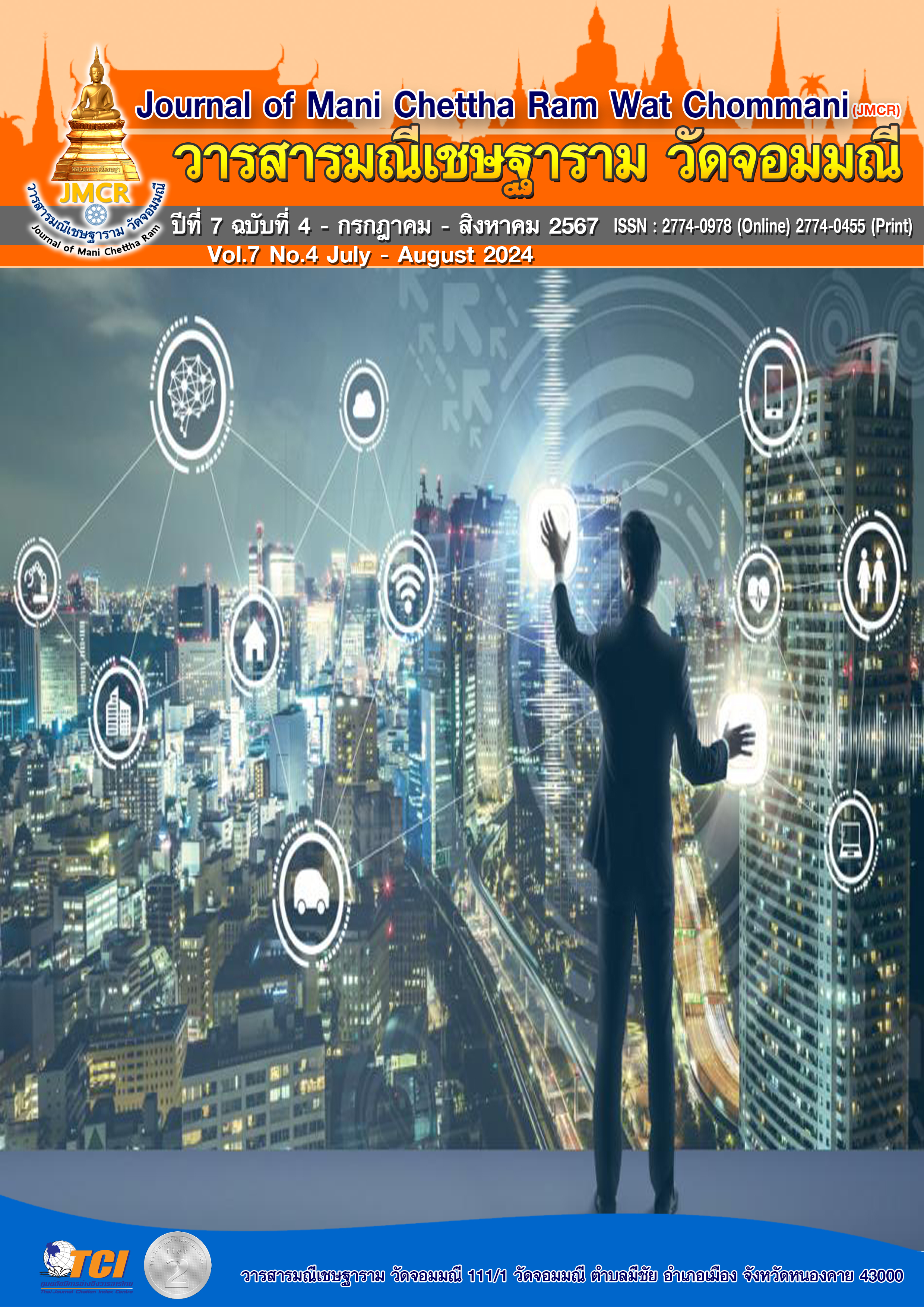THE DEVELOPMENT OF DIGITAL TECHNOLOGY COMPETENCY ENHANCEMENT OF LEARNING MANAGEMENT PROGRAM FOR PRACTICE TEACHERS
Keywords:
program development, learning management competency, student training experienceAbstract
This research aimed 1) to study the components of competency in learning management with the digital technology of teaching professional trainee students 2) to develop a program to enhance the competency of learning management with the digital technology of teaching professional trainee students, and 3) to study the results of using the competency-building program. Learning management with digital technology for teaching professional training students, Phase 1, studying learning management competency components. The group of information providers is 7 experts. Phase 2: Develop a program to enhance the learning management competencies of experiential students. The group of information providers There were 7 experts and in the second phase, the sample group consisted of 26 teaching professional training students by selecting purposive sampling. Research tools included interviews, questionnaires, and evaluation forms. Data were analyzed by averaging. standard deviation.
The research results were found as follows:
- 1. The research results on competency in learning management in the era of digital technology have 5 components: curriculum and learning content. learning management using digital technology to develop learning Setting up the environment and atmosphere and evaluating and researching learning development.
2.The Research results on the development of a program to enhance learning management competency in the digital technology era of teaching students. There are 5 elements: principles, objectives, content, development methods, and measurement and evaluation.The program evaluation results were appropriate at the highest level.
3.The results of the program evaluation found that 3.1 The results of the knowledge test regarding competency in learning management with digital technology after development were higher than before the development at a statistical significance of .05 and 3.1 The results of the satisfaction assessment of students who attended. Overall participation in the program was at the highest level.
References
กระทรวงศึกษาธิการ. (2560). แผนพัฒนาทักษะด้านดิจิทัลข้าราชการครูสังกัดกระทรวงศึกษาธิการ.กรุงเทพมหานคร: สำนักงานปลัดกระทรวงศึกษาธิการ.
จิติมา วรรณศรี. (2564). การบริหารจัดการศึกษายุคเทคโนโลยีดิจิทัล. พิษณุโลก: รัตนสุวรรณการพิมพ์.
ฉัตรชัย หวังมีจงมี และองอาจ นัยพัฒน์. (2560). สมรรถนะครูไทยศตวรรษที่ 21: ปรับการเรียนเปลี่ยนสมรรถนะ. วารสารสถาบันเสริมศึกษาและทรัพยากรมนุษย์ มหาวิทยาลัยธรรมศาสตร์, 20(3), 71-81.
ไฉไลศรี เพชรใต้ และพชรวิทย์ จันทร์ศิริสิร. (2563). การพัฒนาโปรแกรมเสริมสร้างสมรรถนะการจัดการเรียนรู้ของครู สังกัดสำนักงานคณะกรรมการการศึกษาขั้นพื้นฐาน. วารสารสังคมศาสตร์และมานุษยวิทยาเชิงพุทธ, 5(11), 170-184.
นนทลี พรธาดาวิทย์. (2561). การจัดการเรียนรู้แบบ Active Learning. กรุงเทพฯ: ทริปเพิ้ลเอ็ดดูเคชั่น.
บุญฤดี อุดมผล. (2563). การพัฒนารูปแบบการเสริมสร้างสมรรถนะความเป็นครูเชิงพุทธบูรณาการของนักศึกษาคณะครุศาสตร์ มหาวิทยาลัยราชภัฏ. ใน วิทยานิพนธ์ปริญญาพุทธศาสตรดุษฎีบัณฑิต สาขาพุทธบริหารการศึกษา. มหาวิทยาลัยมหาจุฬาลงกรณราชวิทยาลัย.
เพชรจันทร์ ภูทะวัง, (2565). การพัฒนาโปรแกรมเสริมสร้างสมรรถนะการจัดการเรียนรู้เชิงรุกของครูโรงเรียนประถมศึกษา สังกัดสำนักงานคณะกรรมการการศึกษาขั้นพื้นฐาน. ใน วิทยานิพนธ์ปริญญาการศึกษาดุษฎีบัณฑิต สาขาวิชาการบริหารและพัฒนาการศึกษา มหาวิทยาลัยมหาสารคาม.
สำนักงานคณะกรรมการการศึกษาขั้นพื้นฐาน. (2555). คู่มือประเมินสมรรถนะครู (ฉบับปรับปรุง). กรุงเทพมหานคร: สำนักพัฒนาครูและบุคลากรทางการศึกษาขั้นพื้นฐาน.
สำนักงานคณะกรรมการการอุดมศึกษา. (2551). กรอบแผนอุดมศึกษาระยะยาว 15 ปี(พ.ศ.2551 – 2565). กรุงเทพมหานคร: โรงพิมพ์แห่งจุฬาลงกรณ์มหาวิทยาลัย
สำนักงานเลขาธิการคุรุสภา. (2561). สมรรถนะ. กรุงเทพมหานคร: โรงพิมพ์คุรุสภา.
สำนักงานเลขาธิการสภาการศึกษา. (2556). บทวิเคราะห์สถานภาพการพัฒนาครูทั้งระบบและข้อเสนอแนวทางการพัฒนาครูเพื่อพัฒนาคุณภาพผู้เรียน. กรุงเทพมหานคร: บริษัท พริกหวานกราฟฟิก จำกัด.
McClelland, D. (1993). Testing for Competency Rather than for Intelligence. American Psychologist, 28(1), 1-14.
Wenglinsky, H. (2006). Technology and Achievement: The Bottom Line. Educational Leadership, 63(4), 29-32.




